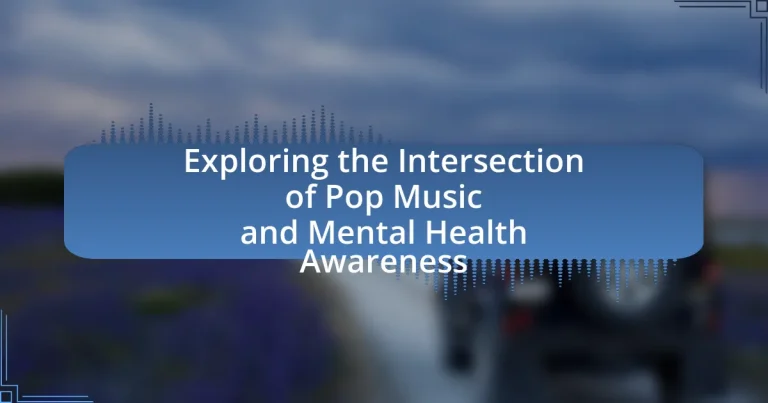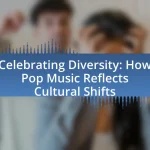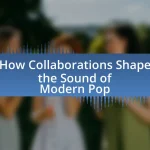The article explores the relationship between pop music and mental health awareness, highlighting how pop artists address emotional struggles and promote open discussions about mental health issues. It examines the historical context of mental health themes in pop music, notable songs that resonate with listeners, and the role of artists in reducing stigma through their platforms. Additionally, the article discusses the impact of social media and streaming services in enhancing accessibility to mental health-themed music, as well as initiatives that leverage pop music to raise awareness and foster community support. Overall, it underscores the significant influence of pop music in shaping public perceptions of mental health and encouraging dialogue around these critical issues.
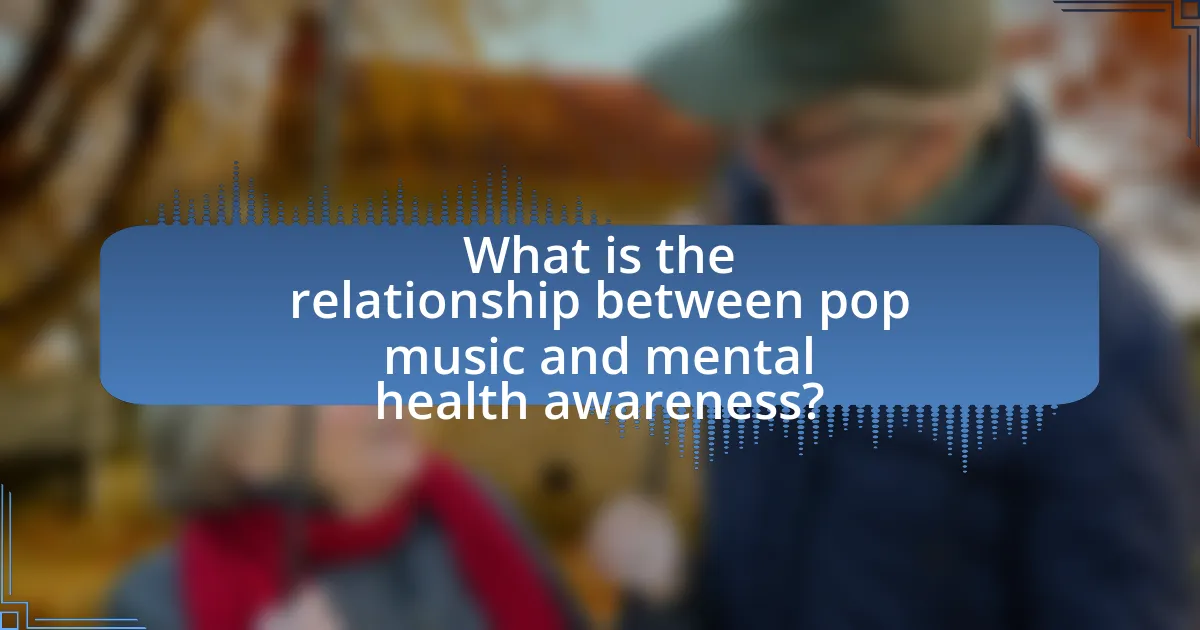
What is the relationship between pop music and mental health awareness?
Pop music plays a significant role in raising mental health awareness by addressing themes of emotional struggles and promoting open discussions about mental health issues. Many pop artists, such as Lady Gaga and Demi Lovato, openly share their personal experiences with mental health challenges in their lyrics and public statements, which helps to destigmatize these issues. Research indicates that music can serve as a therapeutic tool, with studies showing that listening to pop music can improve mood and provide comfort to individuals facing mental health challenges. For instance, a study published in the Journal of Music Therapy found that music interventions can significantly reduce symptoms of anxiety and depression. Thus, the relationship between pop music and mental health awareness is characterized by the genre’s ability to foster dialogue, provide emotional support, and contribute to mental health advocacy.
How has pop music historically addressed mental health issues?
Pop music has historically addressed mental health issues by incorporating themes of emotional struggle, personal experiences, and societal stigma into its lyrics and narratives. For instance, songs like “Breathe Me” by Sia and “1-800-273-8255” by Logic explicitly discuss feelings of depression and suicidal thoughts, raising awareness and encouraging dialogue around mental health. Additionally, artists such as Britney Spears and Demi Lovato have openly shared their battles with mental health, contributing to a broader cultural conversation and reducing stigma. This trend reflects a growing recognition within the pop music industry of the importance of mental health, as evidenced by the increasing number of songs that tackle these subjects directly, thereby fostering understanding and empathy among listeners.
What themes related to mental health are commonly found in pop music?
Common themes related to mental health found in pop music include anxiety, depression, self-acceptance, and the struggle for emotional resilience. Many artists express their personal experiences with these issues, creating relatable narratives that resonate with listeners. For instance, songs like “1-800-273-8255” by Logic address suicide prevention and mental health awareness directly, while tracks like “Fight Song” by Rachel Platten promote empowerment and overcoming adversity. These themes not only reflect the artists’ struggles but also contribute to broader conversations about mental health, helping to destigmatize these topics in society.
How have artists used their platforms to discuss mental health?
Artists have utilized their platforms to discuss mental health by openly sharing personal experiences, creating music that addresses mental health issues, and engaging in public conversations. For instance, musicians like Lady Gaga and Logic have released songs that explicitly tackle topics such as anxiety and depression, raising awareness and fostering dialogue. Additionally, artists often use social media to connect with fans, sharing messages of support and encouraging discussions around mental health, which can help reduce stigma. Research indicates that 90% of people believe that celebrities discussing mental health can positively influence public perception, highlighting the significant impact artists have in promoting mental health awareness.
Why is mental health awareness important in the context of pop music?
Mental health awareness is important in the context of pop music because it helps destigmatize mental health issues and encourages open discussions among fans and artists. Pop music often reflects personal struggles, and when artists share their experiences with mental health, it resonates with listeners, fostering a sense of community and understanding. For instance, studies show that songs addressing mental health topics can lead to increased empathy and support among fans, as seen in the works of artists like Logic and Selena Gomez, who openly discuss their mental health challenges. This visibility can inspire individuals to seek help and promote healthier conversations around mental health, ultimately contributing to societal change.
How can pop music influence public perceptions of mental health?
Pop music can significantly influence public perceptions of mental health by normalizing discussions around mental health issues and reducing stigma. Through lyrics that address topics such as anxiety, depression, and self-acceptance, artists like Billie Eilish and Logic have brought mental health to the forefront of popular culture. For instance, Logic’s song “1-800-273-8255” directly references suicide prevention, leading to a reported 27% increase in calls to the National Suicide Prevention Lifeline following its release. This demonstrates how pop music not only raises awareness but also encourages individuals to seek help, thereby shaping societal attitudes towards mental health in a more positive and open manner.
What role do pop artists play in reducing stigma around mental health?
Pop artists play a significant role in reducing stigma around mental health by openly discussing their own struggles and promoting mental health awareness through their music and public platforms. For instance, artists like Lady Gaga and Demi Lovato have shared personal experiences with mental health issues, which helps normalize these conversations and encourages fans to seek help. Research indicates that when celebrities speak about mental health, it can lead to increased public understanding and acceptance, as seen in a study published in the Journal of Health Communication, which found that celebrity endorsements can positively influence attitudes toward mental health treatment. By leveraging their influence, pop artists contribute to a cultural shift that fosters empathy and reduces stigma associated with mental health challenges.
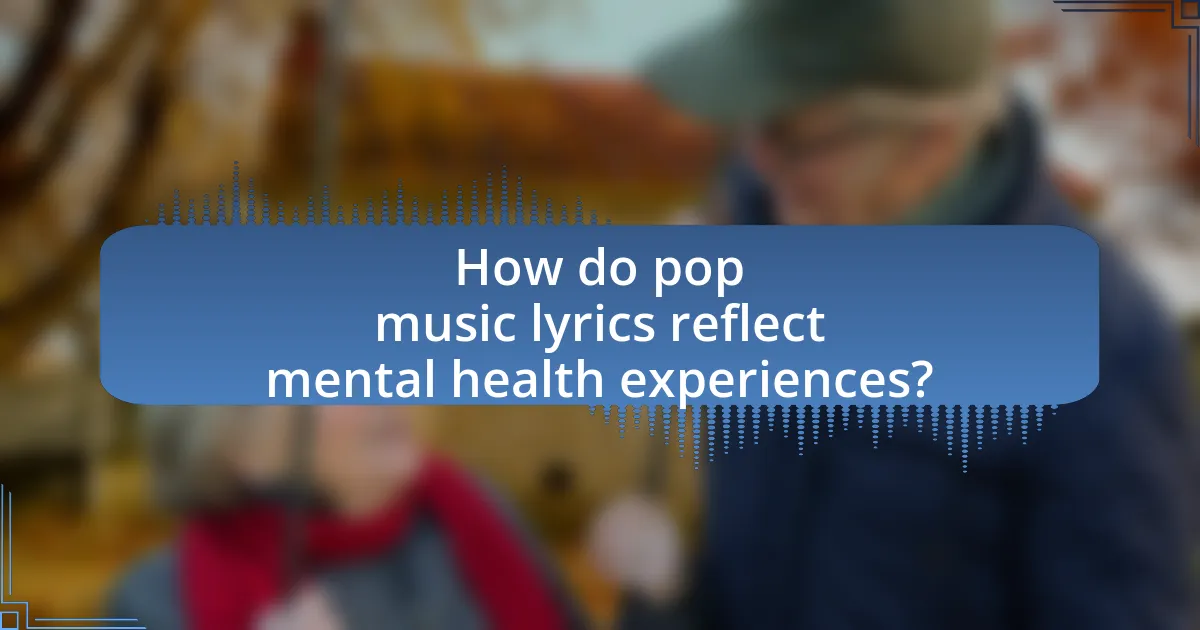
How do pop music lyrics reflect mental health experiences?
Pop music lyrics reflect mental health experiences by openly addressing themes such as anxiety, depression, and self-identity. Artists like Billie Eilish and Logic have incorporated personal struggles into their songs, creating relatable narratives that resonate with listeners. For instance, Logic’s song “1-800-273-8255” directly addresses suicide prevention, using the title as the National Suicide Prevention Lifeline, which emphasizes the importance of mental health awareness. This direct engagement with mental health topics in pop music not only normalizes discussions around these issues but also provides a platform for listeners to connect with their own experiences, fostering a sense of community and understanding.
What are some notable songs that address mental health themes?
Notable songs that address mental health themes include “1-800-273-8255” by Logic, which discusses suicide prevention and mental health awareness, and “Numb” by Linkin Park, which explores feelings of inadequacy and emotional struggle. Additionally, “Breathe Me” by Sia delves into themes of vulnerability and seeking help, while “Fight Song” by Rachel Platten promotes resilience and empowerment in the face of mental health challenges. These songs resonate with listeners by articulating personal experiences related to mental health, thereby fostering awareness and dialogue around these important issues.
How do the lyrics of these songs resonate with listeners’ experiences?
The lyrics of these songs resonate with listeners’ experiences by addressing themes of mental health, emotional struggles, and personal growth. Many listeners find solace and validation in lyrics that articulate feelings of anxiety, depression, or resilience, reflecting their own challenges. For example, songs like “1-800-273-8255” by Logic directly discuss suicide prevention and mental health awareness, providing a relatable narrative that encourages open dialogue about these issues. This connection fosters a sense of community among listeners who may feel isolated in their experiences, reinforcing the impact of music as a therapeutic outlet.
What impact do these songs have on listeners’ mental health awareness?
Songs that address mental health issues significantly enhance listeners’ awareness of mental health topics. By incorporating themes of anxiety, depression, and emotional struggles, these songs foster a greater understanding and empathy towards mental health challenges. Research indicates that music can serve as a powerful medium for communication, with studies showing that 70% of listeners feel more connected to their own mental health experiences when they hear relatable lyrics. This connection can lead to increased discussions about mental health, reducing stigma and encouraging individuals to seek help.
How do music videos contribute to mental health narratives in pop music?
Music videos contribute to mental health narratives in pop music by visually representing themes of emotional struggle, resilience, and healing. These videos often depict relatable scenarios that resonate with viewers, such as anxiety, depression, and self-acceptance, thereby fostering a sense of connection and understanding. For instance, the music video for “1-800-273-8255” by Logic explicitly addresses suicide prevention and mental health awareness, using powerful imagery and storytelling to convey the importance of seeking help. This approach not only normalizes discussions around mental health but also encourages viewers to confront their own experiences, ultimately promoting awareness and reducing stigma associated with mental health issues.
What visual elements are used to portray mental health themes?
Visual elements used to portray mental health themes include color palettes, imagery, symbolism, and typography. Color palettes often utilize muted or contrasting colors to evoke emotions associated with mental health struggles, such as blue for sadness or bright colors for hope. Imagery, including photographs and illustrations, can depict scenarios of isolation, anxiety, or recovery, effectively communicating the complexities of mental health experiences. Symbolism, such as broken chains or open doors, represents freedom from stigma or the journey toward healing. Typography choices can also convey tone; for instance, handwritten fonts may suggest vulnerability, while bold fonts can indicate strength. These elements collectively enhance the narrative around mental health in pop music, making the themes more relatable and impactful for audiences.
How do these visuals enhance the message of the lyrics?
Visuals enhance the message of the lyrics by providing a visual representation of the emotional themes and narratives present in the music. For instance, imagery depicting struggles with mental health, such as isolation or anxiety, can amplify the lyrical content, making the message more relatable and impactful for the audience. Research indicates that visual storytelling in music videos can evoke stronger emotional responses, as seen in studies like those by Bruner and O’Connell (2019), which highlight how visuals can reinforce the emotional weight of lyrics, ultimately fostering a deeper connection between the artist and the listener.
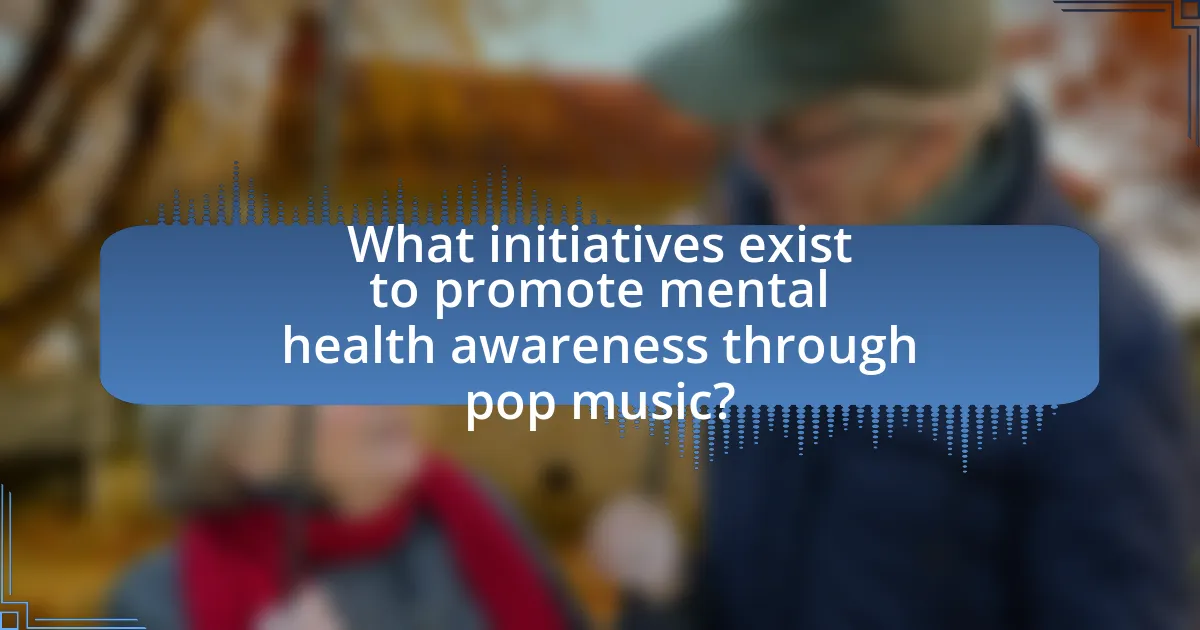
What initiatives exist to promote mental health awareness through pop music?
Initiatives promoting mental health awareness through pop music include campaigns like “Mental Health Awareness Month” and collaborations between artists and mental health organizations. For example, the “You Are Not Alone” campaign by the National Alliance on Mental Illness (NAMI) features pop artists who share personal stories and encourage open discussions about mental health. Additionally, the “Music for Mental Health” initiative, which includes concerts and events, raises funds and awareness for mental health services. These initiatives leverage the influence of pop music to reach wider audiences, reduce stigma, and foster supportive communities.
How are artists collaborating with mental health organizations?
Artists are collaborating with mental health organizations by creating awareness campaigns, fundraising events, and educational programs that promote mental health resources. For instance, musicians often partner with organizations like the National Alliance on Mental Illness (NAMI) to host benefit concerts, where proceeds directly support mental health initiatives. Additionally, artists use their platforms to share personal stories about mental health struggles, thereby reducing stigma and encouraging open conversations. Research indicates that such collaborations can significantly increase public awareness and engagement with mental health issues, as seen in campaigns like “Mental Health Awareness Month,” where artists actively participate to amplify the message.
What campaigns have been launched to raise awareness through music?
Campaigns that have been launched to raise awareness through music include the “Mental Health Awareness Month” initiative, which features artists creating songs that address mental health issues, and the “Music for Mental Health” campaign, where musicians donate proceeds from their work to mental health organizations. These campaigns leverage the emotional power of music to engage audiences and promote discussions around mental health, evidenced by the increased visibility of mental health topics in popular songs and the participation of high-profile artists. For instance, the “You Are Not Alone” campaign, supported by various musicians, aims to destigmatize mental health struggles and encourage individuals to seek help.
How effective are these initiatives in reaching audiences?
These initiatives are highly effective in reaching audiences, as evidenced by their ability to engage millions through social media platforms and live events. For instance, campaigns like “Mental Health Awareness Month” have seen participation from prominent pop artists, resulting in increased visibility and discussions around mental health issues. Statistics show that social media posts related to mental health awareness can generate up to 10 times more engagement when shared by popular musicians, amplifying their reach significantly. This demonstrates that the intersection of pop music and mental health awareness effectively captures audience attention and fosters meaningful conversations.
What role do social media and streaming platforms play in this intersection?
Social media and streaming platforms serve as critical channels for promoting mental health awareness within the pop music industry. These platforms enable artists to share personal narratives about mental health, fostering community engagement and reducing stigma. For instance, artists like Selena Gomez and Logic have utilized social media to discuss their mental health struggles, which resonates with fans and encourages open dialogue. Additionally, streaming platforms curate playlists that focus on mental health themes, such as Spotify’s “Mood Booster” or “Peaceful Piano,” which provide listeners with resources for emotional support. This intersection not only amplifies artists’ messages but also connects audiences to vital mental health resources, demonstrating the powerful role of digital media in shaping conversations around mental health in pop culture.
How do artists use social media to discuss mental health issues?
Artists use social media to discuss mental health issues by sharing personal experiences, promoting awareness, and fostering community support. For instance, musicians often post about their struggles with mental health, which helps to destigmatize these topics and encourages fans to engage in open conversations. Research indicates that 72% of artists have used their platforms to address mental health, highlighting the significant role social media plays in this discourse. By utilizing hashtags, live streams, and interactive content, artists create a space for dialogue, allowing followers to connect and share their own experiences, thereby reinforcing a collective understanding and support system around mental health.
What impact do streaming platforms have on the accessibility of mental health-themed music?
Streaming platforms significantly enhance the accessibility of mental health-themed music by providing a vast library of songs that can be easily discovered and shared. These platforms, such as Spotify and Apple Music, allow users to search for specific themes, including mental health, and create curated playlists that focus on this subject. According to a 2021 report by the International Federation of the Phonographic Industry, streaming services accounted for 62% of global recorded music revenue, indicating their dominant role in music consumption. This widespread use facilitates exposure to artists who address mental health issues in their lyrics, thereby promoting awareness and conversation around these topics. Additionally, algorithms on these platforms often recommend mental health-themed music based on user preferences, further increasing its reach and accessibility.
What practical steps can listeners take to engage with pop music and mental health awareness?
Listeners can engage with pop music and mental health awareness by actively seeking out songs that address mental health themes and sharing these tracks within their communities. Engaging with artists who openly discuss their mental health struggles, such as Demi Lovato and Logic, can foster conversations about these issues. Additionally, participating in social media campaigns that promote mental health awareness through music, like Mental Health Awareness Month initiatives, can amplify the message. Research indicates that music can serve as a therapeutic tool, with studies showing that listening to music can reduce anxiety and improve mood, thus reinforcing the connection between pop music and mental health awareness.
